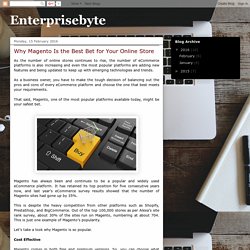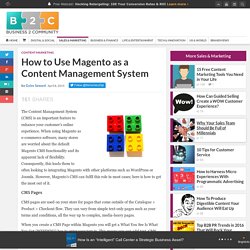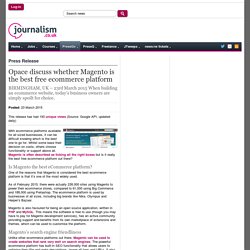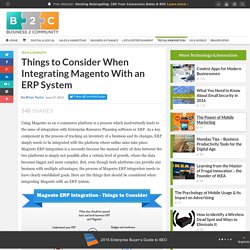

Business Guide On Magento Ecommerce Platform. Enterprisebyte: Why Magento Is the Best Bet for Your Online Store. As the number of online stores continues to rise, the number of eCommerce platforms is also increasing and even the most popular platforms are adding new features and being updated to keep up with emerging technologies and trends.

As a business owner, you have to make the tough decision of balancing out the pros and cons of every eCommerce platform and choose the one that best meets your requirements. That said, Magento, one of the most popular platforms available today, might be your safest bet. Magento has always been and continues to be a popular and widely used eCommerce platform. It has retained its top position for five consecutive years now, and last year’s eCommerce survey results showed that the number of Magento sites had gone up by 35%. This is despite the heavy competition from other platforms such as Shopify, PrestaShop, and BigCommerce. Let’s take a look why Magento is so popular. Cost Effective Magento comes in both free and premium versions. SEO Tools Open Source Security. How to Use Magento as a Content Management System.
The Content Management System (CMS) is an important feature to enhance your customer’s online experience.

When using Magento as e-commerce software, many stores are worried about the default Magento CMS functionality and its apparent lack of flexibility. Consequently, this leads them to often looking to integrating Magento with other platforms such as WordPress or Joomla. However, Magento’s CMS can fulfil this role in most cases; here is how to get the most out of it. CMS Pages CMS pages are used on your store for pages that come outside of the Catalogue > Product > Checkout flow. When you create a CMS Page within Magento you will get a What You See Is What You Get (WYSIWYG) box to enter your text in. Recommended for YouWebcast: Hacking Retargeting: 10X Your Conversion Rates & ROI You will be able to choose specific layout designs and templates, plus the CMS Pages will also let you set the URL path and add meta data for the associated SEO benefits.
CMS Blocks CMS Widgets Customised Modules. Opace discuss whether Magento is the best free ecommerce platform. Press Release BIRMINGHAM, UK – 23rd March 2015 When building an ecommerce website, today’s business owners are simply spoilt for choice.

With ecommerce platforms available for all sized businesses, it can be difficult knowing which is the best one to go for. Whilst some base their decision on costs, others choose functionality or support above all. Things to Consider When Integrating Magento With an ERP System. Using Magento as an e-commerce platform is a process which inadvertently leads to the issue of integration with Enterprise Resource Planning software or ERP.

As a key component in the process of tracking an inventory of a business and its changes, ERP simply needs to be integrated with the platform where online sales take place. Magento ERP integration is a necessity because the manual entry of data between the two platforms is simply not possible after a certain level of growth, where the data becomes bigger and more complex. But, even though both platforms can provide any business with multiple advantages, the process of Magento ERP integration needs to have clearly established goals. Here are the things that should be considered when integrating Magento with an ERP system. Understand the order management process of e-commerce website The very first requirement is to understand the workflow and the elements of Magento’s product related data setup.
Magento, Shopify, WooCommerce: which ecommerce platform works for you? By Christopher Meloni on 27 July, 2015 31 Online portals are a must for every business model now.

Being online can bring great benefits to new business owners who want to get their hands dirty, so to speak, and offer their products to a wider audience. The decision build an online store is therefore a natural one. The really difficult part is choosing the best ecommerce platform? There are hundreds of solutions available for developing ecommerce sites using various platforms.
Magento — The podium for ecommerce professionals Magento is a known shopping cart with around 200 000 live stores. Magento is a solution for highly skilled programmers, so if you aren’t a programmer, then you should probably hire a one from an honest company like Hire Magento Developer. Shopify – An ideal solution to start with Shopify is perfect for non programmers and is one of the simplest, most intuitive shopping carts on the market. WooCommerce – An ace in the hole 1. Shopify takes a few weeks. 2. 3. Why Magento is Ideal for E-Commerce [Infographic] In your search for the perfect E-Commerce platform you might have stumbled upon numerous results.
![Why Magento is Ideal for E-Commerce [Infographic]](http://cdn.pearltrees.com/s/pic/th/magento-commerce-infographic-126020732)
One of those results must have been Magento, which is currently the most popular platform in the US. If you haven’t, go check out the brief summary of what Magento has to offer. If you have, still check it out. You might find some useful information you did not know before. If you had research about Magento, many characteristics must have popped up. Magento features two basic editions, the Community Edition and the Enterprise edition.
Recommended for YouWebcast: Hacking Retargeting: 10X Your Conversion Rates & ROI Meanwhile the Enterprise edition features money and time saving, handling of large websites efficiently, the integration of backup systems into Magento, faster page loading which is enabled by full page caching and other tweaks for enhanced performance, like re-indexing. The Magento E-Commerce platform has great performance, scalability, merchandising and insight.